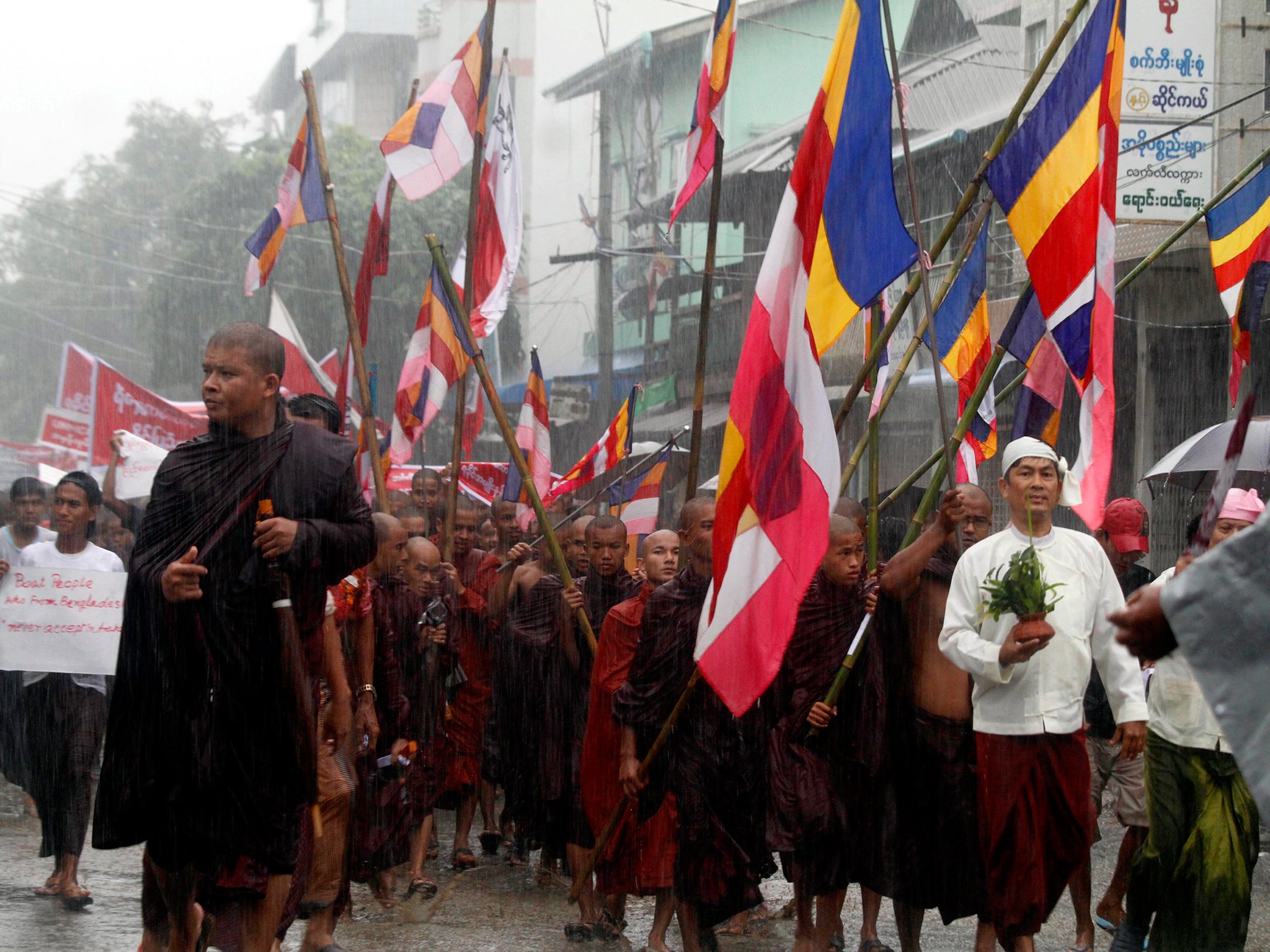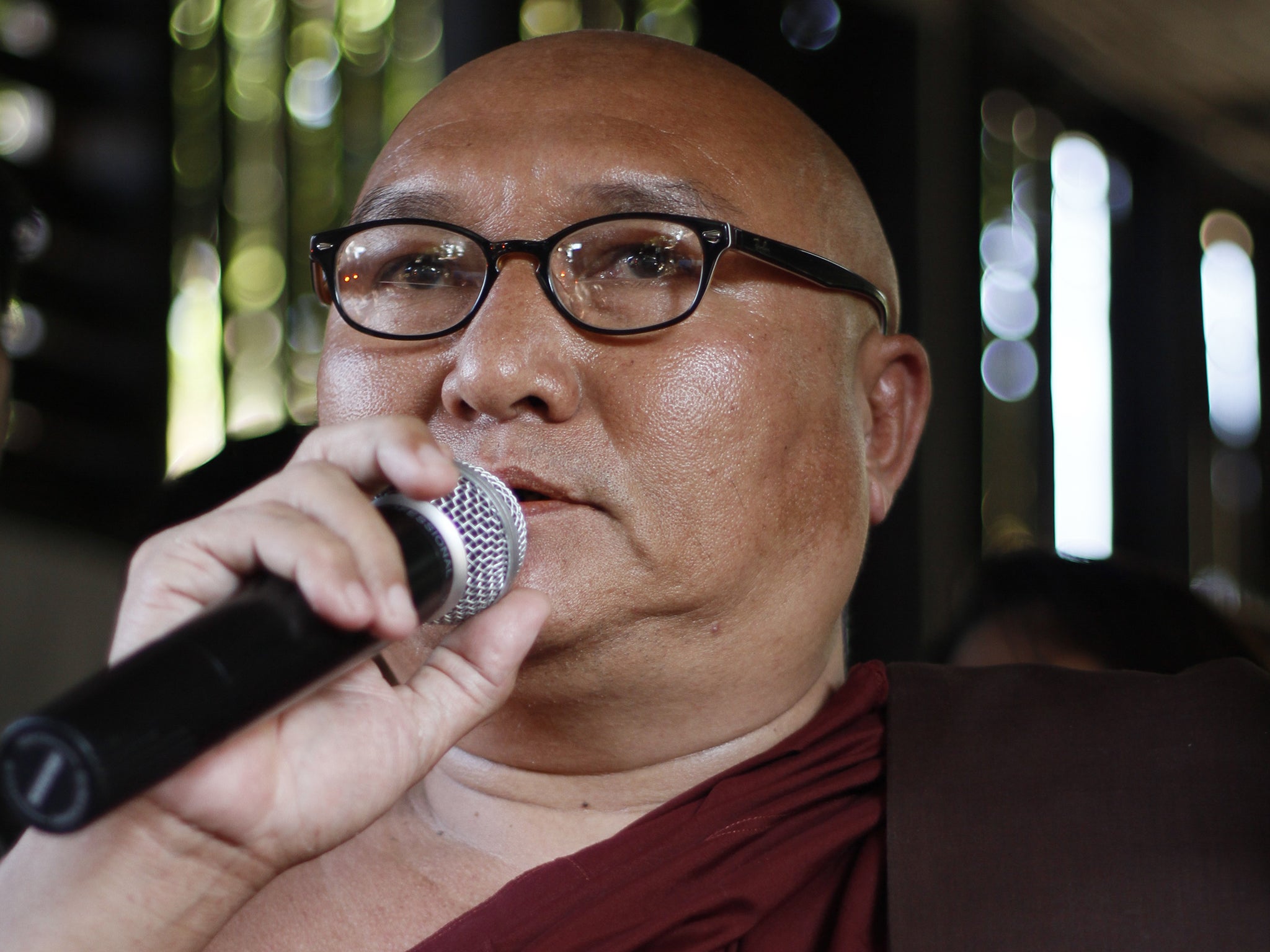Burma's 'great terror' moves a step closer as Taliban urges Rohingya to 'take up the sword'
The oppressed minority has been told only violent jihad will make a difference

Burma’s worst nightmare came a step closer to reality when a spokesman for the Pakistani Taliban’s most hardline faction called on the oppressed Rohingya to “take up the sword and kill in the path of God”.
Other attempts to improve the desperate position of Burma’s Muslim minority were futile, he said last week. “Protest demonstrations, marches [and] condemnation resolutions” were useless. Only violent jihad would make the difference.
This is the great terror of which Burma’s populist Buddhist preachers have for years been warning their congregations, with dire predictions. The hostile climate they have whipped up has led the government to treat the largely stateless Muslim minority in Arakan state ever more inhumanely; and as a result, those predictions could prove self-fulfilling.
The global rise of violent jihadi movements is a challenge to people of many religions and none. But it is a particular issue in Burma, where it feeds into the millenarian fear that Buddhism has peaked, and is now on a downward slope towards extinction.
Popular Buddhist monks, DVDs of whose sermons are sold in street markets alongside Hollywood blockbusters, point out that all Burma’s neighbours were originally Buddhist countries. One by one, starting with India, where the religion was born, their creed, idolatrous in the eyes of Muslims, has been wiped out: in Pakistan, Afghanistan, Bangladesh, Indonesia, Malaysia… In the form of the Rohingya, this discourse goes, the barbarian is at the gate.
It is this climate of millenarian paranoia which accounts for the apparently most un-Buddhist-like behaviour of monks and Buddhist lay people in response to the humanitarian challenge posed by the Rohingya. Compassion, after all, is rightly regarded as a basic Buddhist value. In 2007, hundreds of thousands of monks marched through Burmese towns and cities chanting the metta sutta, the Sutra of Loving-kindness: “Whatever breathing beings there may be… may all beings be endowed with a happy life… Let us cultivate the boundless spirit of love.” There is no clause in the metta sutta excluding Muslims from these wishes.
Last month, monks and their supporters again marched through Rangoon, this time to denounce the blaming of Burma for the crisis of the thousands of Rohingya and Bangladeshis left stranded and slowly dying on traffickers’ boats in the Andaman Sea. Their point was not that the boat people didn’t deserve to be helped, but that Burma was being unfairly blamed for the crisis – unfairly, because the boat people couldn’t possibly be Burmese since they were (dark-skinned, Muslim) Bengalis.
The glaring contradiction is that Rangoon itself is home to thousands of Muslims, as well as Hindus, Christians, Taoists, Jews and atheists, all of whom usually rub along well enough and most of whom have been Burmese for generations. But in the zealots’ view Burma, the last remaining home of what they claim to be “pure” Buddhism, must be kept pure.
More sophisticated Burmese Buddhists are appalled by this stuff. It is obvious nonsense, and it is equally obvious that it is politically inspired. Despite liberalisation, protesting remains a risky activity in Burma, yet the anti-boat people protest was readily given permission, and they marched through streets conveniently cleared of traffic. No policemen were on hand. The danger of this demo escalating into the sort of confrontation in which 30 monks were shot dead by the army in 2007 was nil.
Another straw in the wind is the treatment of a charismatic monk, U Pinnyasiha, who denounces his colleagues’ anti-Muslim rhetoric. The government council in charge of regulating the monks, known as Ma Ha Na, has barred him from preaching, a ban he continues to ignore.

“The way of Buddhism is saving people, helping the people, giving loving kindness to all the people,” he told me at his monastery in suburban Rangoon. “Don’t take account of the skin colour or the particular religion of people, just give them loving kindness. People who refuse to give loving kindness to certain sorts of people are going against the way of Buddhism.” But it is this elemental Buddhist message that he has been barred from spreading.
Buddhism and authority have been tightly entwined in Burma for centuries. Just as the British Crown derives its legitimacy from the monarch’s role as Defender of the Faith, Burmese kings depended on the endorsement of the monks. “For the past 800 years,” writes Ingrid Jordt, an American Buddhist nun-turned-anthropologist, “the authority of the Burmese sovereign has been dependent upon the Sangha, the Buddhist monastic order, whose… of worldly things is the source of spiritual potency, or hpoun… The Sangha must supply hpoun to the ruler, who lacks legitimacy without it.” The ruler in turn patronises and supports the monks, in a symbiotic system.
As the two parties are interdependent, however, the system is vulnerable to disruption, whether by a bad ruler or insubordinate monks or both. That was what happened in 2007, when monks demonstrated against the bad behaviour of the junta, and many were disrobed and some killed in retribution. Pious Burmese believe that the catastrophic Cyclone Nargis which struck six months later was karmic punishment for the killing of those monks.
Today, somebody in the ruling military establishment – galvanised by the potential for serious disruption posed by opposition leader Aung San Suu Kyi in a general election year – is straining every sinew to bring the monks into line. Few monks are sufficiently courageous or independent-minded to oppose a message of “protecting Buddhism”, however toxic its implications. Likewise the Burmese public, fed for years with anti-Muslim prejudice, accept these chauvinistic sermons without a murmur. Liberal and internationally-minded Burmese find themselves dangerously exposed, while Suu Kyi’s enigmatic silence on the matter incurs the wrath even of her Nobel peace laureate friends.
Last week the chauvinists moved up a gear as their umbrella organisation, the Organisation for the Protection of Race and Religion, known as Ma Ba Tha, warned that if any political party “didn’t support Buddhism” the organisation would urge voters to boycott it in the election. Ashin Parmoukkha, Ma Ba Tha’s spokesperson, told the online newspaper Irrawaddy that it had members in more than half Burma’s cities, would subject all parties to the same scrutiny, and could “quickly mobilise” a campaign against any party that was insufficiently supportive of Buddhism.The warning to Burmese liberals was clear enough.
Religion and power make evil bedfellows everywhere. In Sri Lanka, whose brand of Theravada Buddhism is very close to Burma’s, chauvinistic Buddhists in their own political party were a noisy and bellicose anti-Tamil and anti-peace voice during the civil war, in stark denial of the religion’s principles.
The use of religion to sway voters is explicitly banned by Burma’s 2010 Election Law, but given the shakiness of the country’s legal system, and quiet support for Ma Ba Tha by the powers that be, they may well get away with it. The long-term victim will be Buddhism as truly understood. As U Pinnyasiha, the righteous rebel, says, “If people continue to practice three things – morality, wisdom, and intellect - the dharma, the wisdom of Buddhism, will not decline. If people don’t practice them, it will disappear from this world. It just depends how people practice.”
Join our commenting forum
Join thought-provoking conversations, follow other Independent readers and see their replies
0Comments